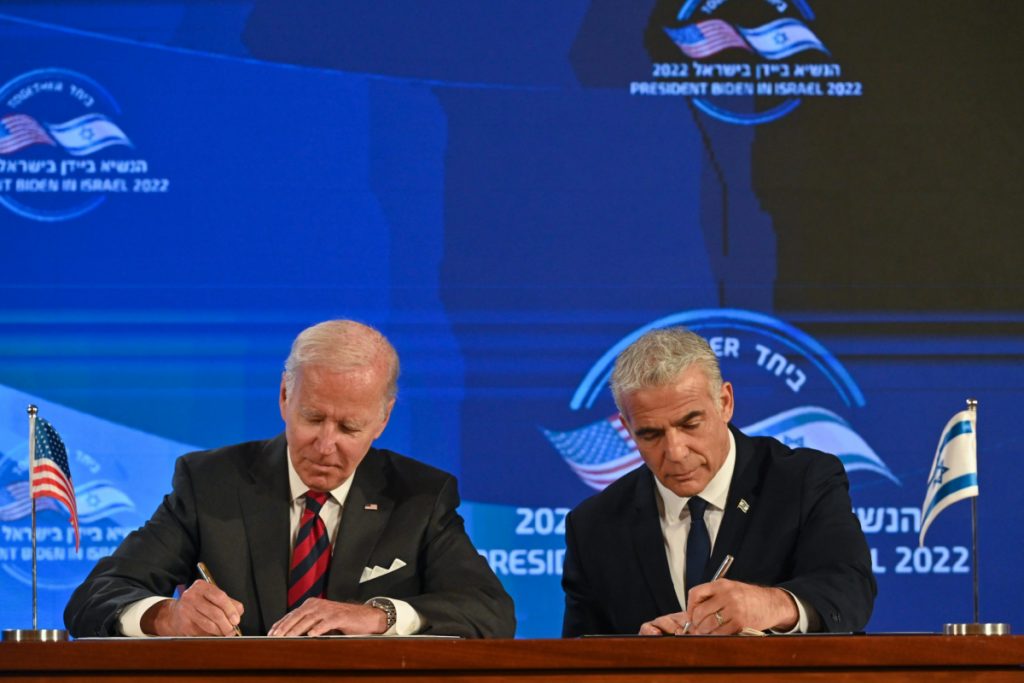Australia/Israel Review
Why Biden’s Jerusalem Declaration matters
Aug 2, 2022 | Elliott Abrams

During his visit to Israel on July 14, US President Joe Biden issued what he and Israel’s Prime Minister Yair Lapid are calling the “Jerusalem Declaration”. Is it of any consequence?
Formally called the “Jerusalem US-Israel Strategic Partnership Joint Declaration,” a phrase no one will remember or repeat, the declaration can be sloughed off as mere rhetoric. It is, after all, binding on neither party and can be forgotten as soon as Prime Minister Lapid or Joe Biden leaves office. In Lapid’s case, that could be just a few months away. Barack Obama contemptuously dismissed the pledges made in a letter by President George W. Bush in 2004 to then-Prime Minister Ariel Sharon – even after large majorities in both houses of Congress had affirmed those pledges. This reveals what words are sometimes worth – even a president’s words.
Yet this declaration does matter.
First, as president, Joe Biden had only once, offhandedly, said Iran would not be permitted to get a nuclear weapon “on my watch”. This was a far cry from more specific commitments made by his predecessors, including Barack Obama in 2012. Biden has only now, in the declaration, said something specific and earnest:
The United States stresses that integral to this pledge [to preserve and strengthen Israel’s capability to deter its enemies and to defend itself by itself against any threat or combination of threats] is the commitment never to allow Iran to acquire a nuclear weapon, and that it is prepared to use all elements of its national power to ensure that outcome.
Though not using the words “force” or “military force” (whose use would have made this declaration stronger), Biden has taken a significant step forward. Previously, the Administration had spoken of using only diplomatic and economic pressure on Iran, so “all elements of national power” is a more substantial threat.
And in an interview with Israel’s Channel 12, when Biden was asked whether he would use force to stop Iran from getting nukes, he replied, “If that was the last resort, yes.”
The dissonance between Biden’s new, more rigid line and his endless, fruitless nuclear negotiations with Iran is evident; equally evident are the likely future gaps between the United States and Israel about when Iranian nuclear advances mean the time for that “last resort” has actually been reached. Nevertheless, travelling to Israel has forced Joe Biden to confront the Iranian nuclear weapons issue as he had never done before.
Biden also fully embraces in this declaration the “Abraham Accords” – a series of agreements between Israel and various Arab states negotiated by the Trump Administration. Initially, Biden was cool to this Trump achievement. But in this declaration, he is entirely committed: The Accords “are important to the future of the Middle East region and to the cause of regional security, prosperity, and peace.”
Second, Biden’s repetition of pledges to Israel that previous presidents have made is consequential because it is 2022, and the Democratic Party is drifting into an anti-Israel position. The most recent Pew poll finds that while Republicans view Israel more favourably than they view Palestinians by a two-to-one margin, Democrats view Palestinians slightly more favourably – and this is just one in a series of polls going back years and tracing the evolution of Democrats away from support for Israel. There is now a group of Democrats in the House of Representatives whose hostility to Israel is displayed frequently in votes and speeches.
In that context, Biden’s adherence to the “old religion”, the support for Israel that used to characterise Democrats when he was a younger man, is a valuable antidote to recent trends. From the viewpoint of Israel and its supporters, there is some utility in having a Democratic president who is 79-years-old and knew Golda Meir and Yitzhak Rabin. Still, how powerful that antidote proves is simply unknowable – as is Biden’s ability to affect the views of Democratic voters, especially younger ones, about US-Israeli relations.
Biden will be in office next year when Israel celebrates its 75th anniversary. He can proudly tell the story of how his Democrat predecessor, Harry Truman, recognised the infant state within minutes of its Declaration of Independence.
Whether this “Jerusalem Declaration” will eventually be seen as just one in a series of such collegial US-Israel statements or as an anachronism reflecting an aged president who no longer represented the views of his party will be clear only long after Biden has passed from the scene.
Elliott Abrams is a senior fellow at the Council on Foreign Relations and the chairman of the Vandenberg Coalition. © National Review (www.nationalreview.com), reprinted by permission, all rights reserved.
Tags: Iran, Israel, United States






